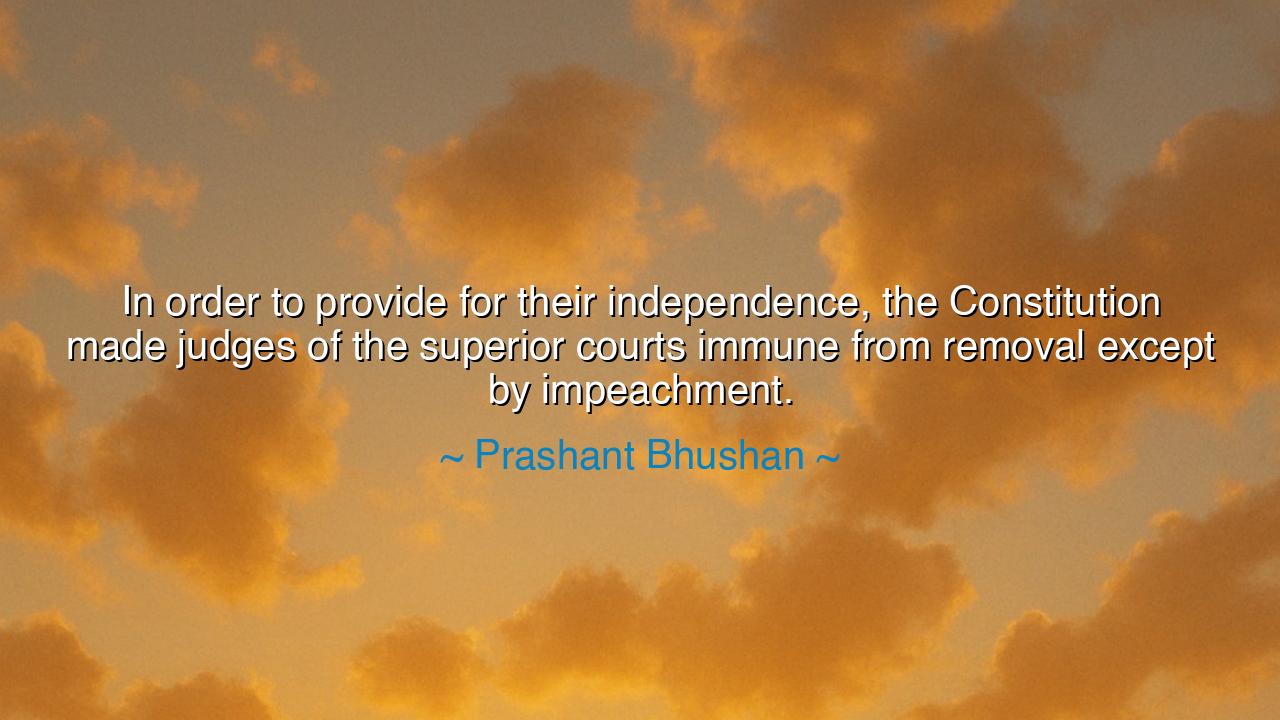
In order to provide for their independence, the Constitution made
In order to provide for their independence, the Constitution made judges of the superior courts immune from removal except by impeachment.






"In order to provide for their independence, the Constitution made judges of the superior courts immune from removal except by impeachment." — thus spoke Prashant Bhushan, the advocate and guardian of justice, revealing one of the deepest pillars upon which a free republic stands: the independence of the judiciary. His words are not merely legal commentary; they are the echo of an ancient truth — that justice cannot serve the people if those who dispense it are bound by fear or favor. For the law, to be righteous, must stand apart from the tempests of politics, and the judge must speak only to the voice of conscience and the Constitution.
When Bhushan speaks of immunity from removal except by impeachment, he recalls the wisdom of the framers who foresaw that power, if left unchecked, devours truth. The Constitution, therefore, forged a shield around its judges, not to elevate them above the people, but to protect them from the claws of tyranny. For if a judge could be dismissed at the whim of rulers, then the law would become a servant to authority, and justice a hollow word. Independence, in this sense, is not privilege — it is the breath of fairness, the armor of freedom itself.
The ancients, too, understood this sacred principle. In the courts of Solon’s Athens and in the Senate of Rome, when the rule of law stood strong, civilization flourished; but when kings and emperors began to bend the judgment of courts to their will, darkness followed. History teaches us this: that the corruption of the judiciary is the first crack in the foundation of liberty. Thus, the framers of modern constitutions — in India, in America, and across the free world — enshrined this safeguard, knowing that without judicial independence, all other freedoms would crumble like sand before the tide.
In India’s own story, this principle was tested in the fires of political turmoil. During the Emergency of 1975, when power silenced dissent and fear stalked the courts, a few judges still rose, unbowed and unbending. Among them was Justice H.R. Khanna, who, in the famous ADM Jabalpur case, stood alone in declaring that even in a state of emergency, the right to life and liberty could not be extinguished. For that stand, he was denied his rightful elevation to Chief Justice — but his name was etched forever in the memory of justice. His act embodied the spirit of judicial independence that Bhushan’s words now defend.
Yet independence is not isolation. The Constitution gives judges protection, but it also demands of them honor, humility, and integrity. Their shield is not meant for arrogance or corruption, but for courage. To be beyond removal is not to be beyond reproach. The framers believed that such protection would enable judges to act with purity — to judge kings and paupers alike with equal hand. But if a judge forgets this sacred trust, if immunity becomes complacency, then the protection meant to defend justice becomes its downfall.
Thus, Bhushan’s words carry both reverence and warning. Independence is a delicate flame — bright enough to light the path of freedom, yet fragile if not guarded by virtue. The people must cherish this flame, and those who bear it must remember that they serve not governments, nor factions, but truth itself. For when judges are fearless, the weak find a voice; but when judges yield to pressure, the strong become untouchable and the nation loses its soul.
So, children of a free land, learn from this wisdom: protect the independence of your courts as you would protect your own liberty. Hold your judges to the highest standards, yet defend them from the wrath of power. Speak against corruption, but never permit the law to be shackled by politics. For the Constitution, in its foresight, built this fortress not for privilege, but for justice — that no ruler might stand above the law, and no citizen beneath its protection. And when that principle is upheld, the republic stands tall, and the light of freedom burns unbroken across the generations.






AAdministratorAdministrator
Welcome, honored guests. Please leave a comment, we will respond soon